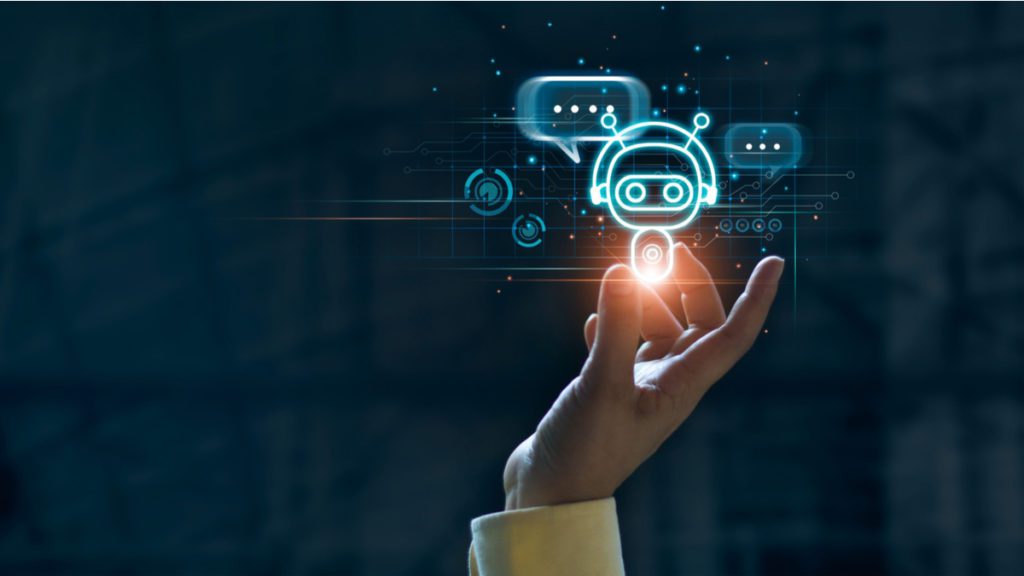As CIO for a mid-market manufacturing company, I am always looking for ways that we can use technological advancements to compete with organizations many times our size. One such technology that has the potential to bridge the gap is artificial intelligence (AI).
In the past, AI was limited to those companies who could afford to invest in high-end systems and hire specialized staff who could configure and operate those systems. The proliferation of AI in consumer technology—such as Siri, Alexa, Google Assistant, and Cortana—has resulted in a trickle-down of that sophisticated functionality into software and services, which is finally in reach for companies of all sizes.
There are four areas where AI can have a big impact: customer service, sales & marketing, human resources, and cybersecurity.
1. Customer Service
Chatbots
Adding a chatbot to your website can help you get answers to your customers much more quickly and cost-effectively. Services, like Ada, claim to resolve as many as 80% of standard customer inquiries, with an easy-to-use platform that makes things simple for non-technical employees.
Delivery
Ever since Amazon started offering two-day shipping, and then progressed to one-day shipping, and in many cases same-day shipping, the pressure is on all companies to provide fast, accurate delivery of their products directly to the end-user. Optimizing routes and overcoming traffic delays present challenges that can be assisted by the use of AI.
DispatchTrack is one such solution that offers an AI-powered solution that includes Last Mile Delivery, Route Optimizations, and Order Tracking, all with the goal of helping create a five-star delivery experience.
2. Sales & Marketing
Customer Relationship Management
Managing the sales process as well as marketing campaigns used to take an enormous amount of detailed manual work. AI-powered CRM tools can help cut through all the data to make decisions quickly.
Salesforce Einstein, for instance, offers a variety of tools including a prediction builder for predicting business outcomes such as churn or lifetime value, image recognition through deep learning models to recognize your brand and products, and language processing to classify underlying intent and sentiment in text such as comments, tweets, or reviews.
Customer Appointment Scheduling
We’ve all been through the frustrating experience of trying to set an appointment, where you have to leave a message and wait for a callback or navigate some hard-to-use website. This is an area that greatly benefits from an AI-powered scheduling solution.
SmartAction offers an AI virtual agent that handles your scheduling 24/7. Self-service scheduling empowers your customers to schedule, change, or cancel appointments at any time of day. It can generate outbound reminders, and even provides a conversational bot that makes it easy to negotiate a time that works for both parties.
3. Human Resources
Hiring Process
According to an article in Forbes, AI “can drastically improve both how individuals find jobs and how companies hire. AI-driven application processing is not only becoming more creative and effective over time; it also frees up time for recruiters to focus more on getting to know their top applicants and hence making more informed hiring decisions.”
Eightfold Talent Acquisition offers a complete platform for using Deep Learning AI to hire top talent, increase diversity, and offer a compelling candidate experience.
Streamline Onboarding
Once you’ve hired the right people, you want to make sure that they have a good experience at your company. Those first impressions are very important, and you can lose a great hire if their onboarding experience gives them a negative view of your company on the first day.
Repeatable, quality onboarding experiences are possible using a good system, and AI can help. Levity offers an AI solution to automate your employee onboarding process, resulting in faster time to productivity, an engaged employee, and increased employee retention.
4. Cybersecurity
Automate Security Measures
Smaller companies don’t have the resources to employ full-time cybersecurity experts that monitor every aspect of a network watching for suspicious behavior. One tool that most companies have employed to help automate the job of cybersecurity monitoring is called a SIEM (Security Information Event Management) solution. These solutions can monitor, detect, investigate and respond to threats automatically.
The problem is that many of these SIEMs require humans to manually write the rules that are used to detect threats. This can be very time-consuming and requires advanced knowledge of cybersecurity.
AI can provide an easier way to create and manage these rules. For instance, Adlumin has a next-generation SIEM with AI and Machine Learning. According to their product information, their “learning algorithms analyze account-based threats and write SIEM rules with the ability to re-write those rules over time” and it can “identify, detect, analyze, and prioritize anomalous behavior—without any input from your cybersecurity team.”
Final Thoughts on AI for Small Businesses
There are many solutions available to help you make your smaller company more efficient, and better able to keep up with much larger competitors. The key is to identify an area where you have a gap that has been difficult to solve because of the high cost of staffing or expertise. Explore the available AI-powered solutions available today and see if there is one that would help fill that gap.











